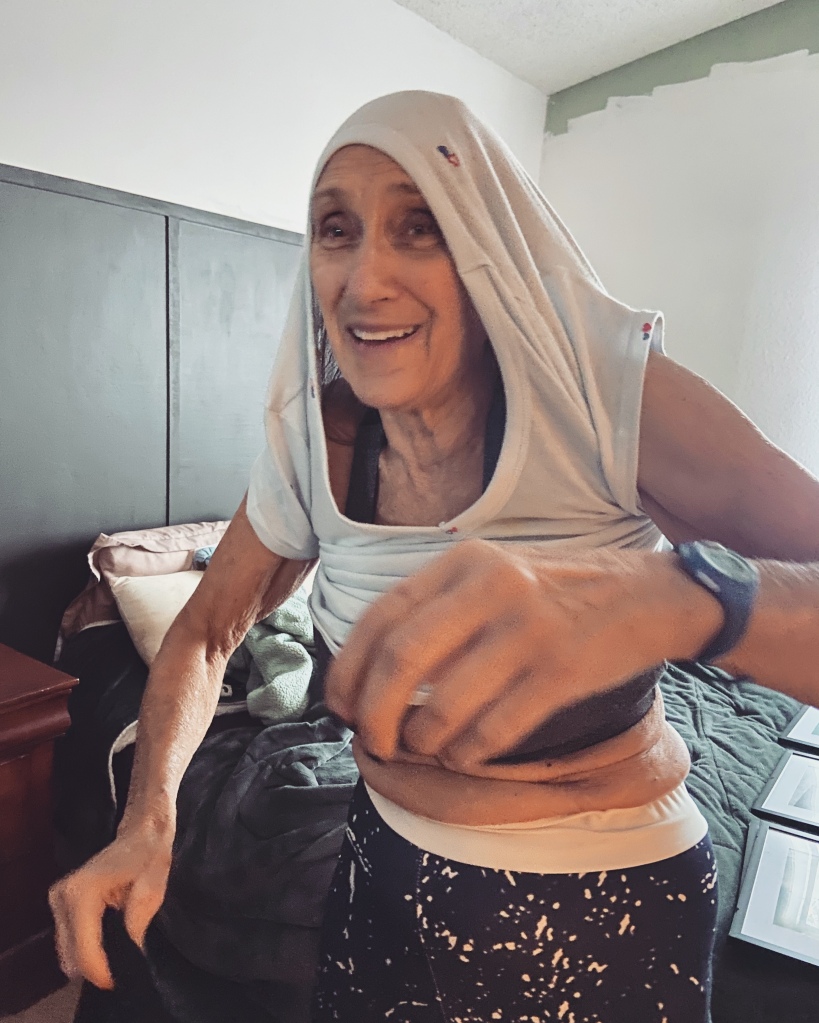
The tapering of summer is welcome, but there is deflation, too. It is not unlike the crash after an adrenaline rush of thrill-seeking car rides or a near-miss from unexpected peril. There is gratitude and reflection, a clutching satisfaction of all that was overcome. Coming down from the sweltering high of scheduling clients six days a week since May is a descent well-earned. I am proud of the twelve- and thirteen-hour workdays I frequently committed to, but I’m equally grateful that only half of the year is like this. Autumn is the annual summit I climb toward, simultaneously revering and saying adieu at the finish line.
Credit is due to my father, who graciously watched over Mom three days a week so that I could teach the bulk of my students. Without his help I wouldn’t have been successful at earning a decent living. I still can’t get over how my parents get along better now than they did when they were married. That’s not to give the impression that their dynamic now is seamless, but they have come a long way from where they were. A silver lining of dementia and the passing of time.
Some months ago I commended a parent of one of my students for how she juggles her children’s schedules in addition to everything else on her plate.
“I don’t know how you do it.”
Without pause she said, “Yes you do.”
Between Mom and the families I work with I have a lot of the same conversations repeatedly. With themes of “What is your availability?” and “Here’s what progress has been made and the goals we’ll continue working on:” and delivering well deserved praise, sometimes it’s difficult for me to turn off my mouth’s autopilot. This person gently reminded me that I absolutely do know what it’s like to juggle the responsibilities of a parent. Saying “I don’t know how you do it.” was the every day nod I give to parents, but it is somewhat in disservice of myself.
Precious hours of “time off” from work in early summer mornings, late evenings, or on Sundays, were either spent catching up on housework or attempting to recharge some percentage of energy reserves in between the required attention and assistance Mom needs daily. Despite sneaking in occasional twenty-minute naps and usually getting seven or eight hours of sleep at night there was no escape from being tired. Never mind all of the other to-do tasks that had to be bumped down the priority list.
Mom’s healthcare plan at Kaiser had lapsed awhile back, so when my sister signed her up again in the spring I booked a bunch of appointments. Over the summer I took her for a physical checkup, optometry assessment, mammogram, and an Alzheimer’s diagnostic to assess where she is at with her decline.
Her body is very healthy, but her cognition is now comparable to that of a four-year-old. A mournsome Benjamin Button of sorts.
Earlier this year an acquaintance of mine lamented about their son growing up. They grieved the transition from reliant kid to independent young adult. Coming to terms with being less in the forefront of the son’s day to day needs and knowing that a chapter is soon to close was weighing heavy. After relating the dynamic experience of parenthood to that of caregiving for Mom, I gently recalibrated their well-intentioned perception.
“I’m single parenting someone who is not growing and learning and becoming their own person, but slowly dying and losing everything unique about them. Different from your situation, but both hard.”
Grief is a language with many dialects. There is an underlying level of empathy between those that know it, but the nuances are not always readily understood.
Years ago another friend of mine was responsible for encouraging travel before and after summer as a way to both prepare and unwind. Between the pandemic and increasing caregiving demands this has become a selfcare privilege that has become increasingly challenging to execute. The trip to Oregon last April was the closest I’ve felt to normal in a long time. The logical part of me expected the plans not to work out. I’ve learned not to rely on most other people, no matter how wonderful their intentions are. Very few people have follow through.
Last December I had expressed to my family that all I wanted for Christmas and my December birthday was a vacation. On two occasions when I was asked what I’d like for gifts, my response was the same. Yet when the holiday and my thirty-second birthday came and went, nothing was mentioned about giving me relief from caregiving.
A few days after Christmas I sent out a group text. I expressed gratitude for the gifts given to me but bluntly stated that I was not joking about needing a two-week vacation. The response, from one person, was “We’ll make it happen.” As expected, the other person didn’t respond at all.
Due to the distrust I have for good intentions, I couldn’t help but be skeptical that I would actually be able to leave. In fact, I was so nonchalant about the upcoming vacation that it threw some people off. They had no idea that I wouldn’t dare to anticipate a long overdue break. If I did allow myself to get excited in the weeks and days leading up to it, and for any reason the trip had to be canceled, the disappointment would swallow me whole.
Four months later I was on my way to Oregon for a ten-day trip. It wasn’t quite the two weeks I had asked for, but it was something.
In the last days leading up to my departure I began to feel the chill of my emotional guard slowly defrost. I was beyond grateful to have the opportunity to temporarily return to normalcy, but it was tainted ever so slightly by disappointment. I had to ask three times in order to be taken seriously. The two weeks I had requested were cut short because of the poor planning choices of my replacement. The trip was set to happen nearly five months after I first mentioned the need for it. So yes, I was thrilled that I was actually going to be able to be free of Mom for a while, but I could not disregard the missteps of others, even when they were trying to do a good deed. You can love someone immensely and be disappointed in them at the same time. Conflicting characteristics and emotions are not mutually exclusive.
During a conversation with a friend of mine I was told how a buddy of theirs can’t always be flexible with their availability to socialize because they have kids. Their duties of parenthood superseded their desire to spend time outside of that role.
My friend then said something along the lines of, “It’s not like you and I. We don’t have kids so we can come and go as we please.” I nodded politely, so as not to interrupt the touchy story they were conveying, but inside I was vehemently disagreeing. I wasn’t mad, of course, as this person is quite wonderful in many ways, but I was thrown off by this perception of me. I had shared many, many caregiving stories with this particular friend so it was a shock that someone believed I had the same freedoms as them. In reality I spend moments of every day internally agonizing about all of the things I am missing out on. I’m grateful for many aspects of my existence and privileges, but I also know that Alzheimers has made me a stationary observer of the perpendicular lives of my peers. Those of which are dutifully parading by like clouds being carried on the sky, always moving forward.
What’s interesting is that most of the people I have mentioned above have family members, usually a grandparent, afflicted with Alzheimer’s, but they aren’t caregivers for that loved one. They see and experience many of the hardships of watching someone wither away into an unrecognizable being, but they don’t necessarily understand the whole picture. They don’t know what it is to clean up the bathroom floor right next to the toilet because their mom couldn’t figure out how to remove her one-piece bathing suit off. They cannot understand how it feels to ask and answer the same dozen questions every single day, multiple times a day, for years and years until you feel like a shell of yourself because your social interactions at home made you feel like you’ve descended into madness. They cannot fathom the gut punch of comforting a seventy-one year old woman crying for her mommy, or watching her get lost in the home that she shared for twenty years.

To be clear, I am disappointed in the perspective, not the dear friends of mine. They watch me and other caregivers through a grayscale lens. They can see the situation and the people in it, but the nuances of color are left to the imagination. It’s not their fault that they don’t know what’s beyond the realm of their reality. This is exactly why I feel it’s important for caregivers to share their stories. And it’s partially responsible for my drive to put my own story out in the world. Without honesty we lose an opportunity to connect, learn, empathize, and make changes for the betterment of us all.
With family I struggle with extending this same contingency. I feel like the culture of complacency that often leaves the burden of caregiving heavily on the shoulders of one family member needs to change. I especially have a difficult time doling out continued patience to familial spectators who should be stepping up to help, but don’t, yet they have plenty of criticisms to bestow upon me from the sidelines.
As humans we all make assumptions about people and situations based on our own experiences, biases, selfish desires, and the limited contexts we are aware of. It is the duty of an evolving person to contribute to the world by continually learning how to not just understand that which is around and beyond us, but to understand deeper. As new pieces of information come to light it’s more than okay to color one’s black and white perspective with hues of color and nuance. The more diverse our palette, the more kindness, equality, and progression is likely to ripen to fruition.
From one flawed human to another, thank you for being here to expand the palette of your world view. I aim to continue holding myself accountable to do the same.
Mary
I’m always shocked at how well you can convey your feelings about caregiving. Your posts bring me a different sense of peace. I know I’m not alone in this, and there are many people our age in the same situation. Sending you and your mom all the good vibes. Hang in there.
P.S. any tips on how to handle shitty family? lolol kidding…maybe.
LikeLike